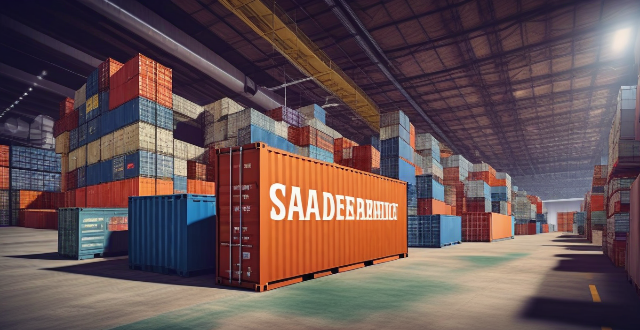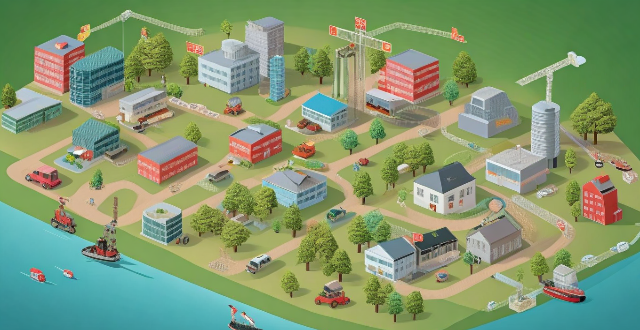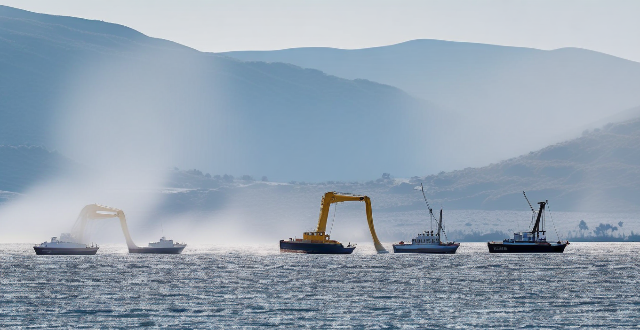Trade Development

How do international trade agreements influence environmental policies and sustainability efforts ?
International trade agreements significantly influence environmental policies and sustainability efforts through harmonization of standards, potential for environmental dumping, promotion of green trade practices, and challenges in balancing trade liberalization with environmental protection. These agreements can either elevate global environmental standards or lead to a race to the bottom in regulatory protections. Policymakers must navigate the complexities of these agreements to ensure they support sustainable development goals without undermining environmental commitments.

In what ways do economic factors influence the development and assessment of climate policies ?
Economic factors play a crucial role in the development and evaluation of climate policies, affecting decision-making processes, implementation measures, and assessments of effectiveness. These influences include cost-benefit analysis considering both direct and indirect costs, as well as quantifying avoided costs and non-market benefits. Economic growth and development must balance immediate needs against long-term sustainability goals, potentially leading to tension between current jobs and investment in cleaner technologies. International trade and competitiveness are impacted by concerns over carbon leakage and green trade barriers. Public acceptance and political will are influenced by perceptions of fairness and economic impacts on different income groups, while innovation and technology development depend on investments in research and development and the affordability of technology transfer. Overall, achieving effective climate action requires a careful consideration of economic dynamics alongside environmental objectives.

How do climate change negotiations affect global trade and economic systems ?
Climate change negotiations play a crucial role in shaping global trade and economic systems. These negotiations aim to find solutions to the challenges posed by climate change, such as reducing greenhouse gas emissions, promoting renewable energy sources, and protecting biodiversity. The outcomes of these negotiations have far-reaching implications for international trade, investment, and economic development. In this article, we will explore how climate change negotiations affect global trade and economic systems. One of the key impacts of climate change negotiations on international trade is the imposition of tariffs and subsidies on goods and services that contribute to climate change. For example, countries may impose higher tariffs on imported goods that are produced using high levels of carbon emissions or other environmentally harmful practices. Similarly, governments may provide subsidies to domestic industries that adopt sustainable practices or invest in renewable energy technologies. These measures can create trade barriers and distort market competition, affecting global trade patterns. Another way in which climate change negotiations can influence international trade is through the implementation of carbon pricing mechanisms, such as carbon taxes or cap-and-trade systems. These mechanisms aim to internalize the external costs of carbon emissions by making polluters pay for their emissions. As a result, companies that rely heavily on fossil fuels or produce high levels of emissions may face increased costs, making their products less competitive in global markets. On the other hand, companies that invest in low-carbon technologies or adopt sustainable practices may gain a competitive advantage. Climate change negotiations often lead to the adoption of stricter environmental standards and regulations at both national and international levels. These standards can affect international trade by creating compliance costs for exporters and importers. For instance, companies that export goods to countries with stringent environmental regulations may need to invest in cleaner production processes or face penalties for non-compliance. Similarly, importers may prefer to source goods from suppliers that meet certain environmental standards, affecting trade flows and market access. Climate change negotiations also have significant implications for investment and economic development. As countries commit to achieving ambitious climate targets, there is an increasing demand for green finance and investment in sustainable projects. This can create new opportunities for investors and businesses that focus on renewable energy, energy efficiency, and other low-carbon sectors. However, it can also lead to capital flight from traditional fossil fuel industries, affecting economies that rely heavily on these sectors. Climate change negotiations often include provisions for technology transfer and innovation cooperation between developed and developing countries. This can help bridge the gap between countries with different levels of technological capabilities and promote sustainable development worldwide. By facilitating the transfer of clean energy technologies and supporting research and development efforts, climate change negotiations can foster economic growth and job creation in emerging markets. Finally, climate change negotiations address the urgent need for adaptation financing and support for vulnerable communities affected by climate change. This includes funding for infrastructure improvements, disaster risk reduction, and other measures that help countries adapt to changing climate conditions. While these efforts are essential for protecting human lives and livelihoods, they also represent significant economic opportunities for businesses involved in climate resilience and adaptation services. In conclusion, climate change negotiations have far-reaching implications for global trade and economic systems. By imposing tariffs and subsidies, implementing carbon pricing mechanisms, setting environmental standards, promoting green finance and investment, facilitating technology transfer and innovation, and providing adaptation financing and support, these negotiations shape the future direction of international trade and economic development. As we continue to grapple with the challenges posed by climate change, it is crucial for policymakers, businesses, and civil society to work together to ensure that our responses to this global challenge are aligned with our collective goals for sustainable prosperity.

What is the latest update on the NBA trade deadline ?
The NBA trade deadline has passed, resulting in severalThe NBA trade deadline has passed, resulting in several impact the league's play resulting in several notable trades that could impact the league's playoff race and future team dynamics. Key trades include the Boston Celtics acquiring Evan Fournier, the San Antonio Spurs sending LaMarcus Aldridge to the Brooklyn Nets, the Golden State Warriors acquiring Andrew Wiggins and D'Angelo Russell, and the Miami Heat acquiring Andre Iguodala. These moves have implications for both the teams involved and the league as a whole, with potential shifts in power and long-term effects on player development and team rebuilding efforts. Fan reactions to these trades have been mixed, with excitement and disappointment among different fan bases.

Can I trade in my old iPhone for a new one ?
This article discusses various options for trading in an old iPhone for a new one, including Apple's trade-in program, carrier trade-in programs, and third-party trade-in websites. It highlights the benefits and considerations of each option and provides tips on how to get the most value for your old device.

How have recent trade tensions impacted international finance ?
Recent trade tensions have had a significant impact on international finance, increasing uncertainty, contributing to volatility in financial markets, and leading to changes in investment patterns. Companies may hesitate to make long-term commitments or expand into new markets due to the uncertainty created by trade tensions. Additionally, sudden announcements of new tariffs or trade restrictions can cause stock prices to drop rapidly, while news of a potential resolution can cause them to rise quickly. Changes in investment patterns may also occur as companies invest more heavily in countries where they are less likely to face trade barriers, and investors shift their portfolios away from industries that are likely to be impacted by trade tensions.

How do ecological taxes compare to other environmental policies, such as cap-and-trade systems ?
The text discusses the comparison of two environmental policies: ecological taxes and cap-and-trade systems. It explains what these policies are, their advantages, disadvantages, and concludes that the choice between them depends on political feasibility, administrative capacity, and public acceptance.

How does a carbon tax compare to other climate policies, such as cap-and-trade ?
**Comparison between Carbon Tax and Cap-and-Trade Climate Policies:** **Effectiveness:** - **Carbon Tax**: Depends on tax rate, revenue recycling, and international cooperation. Higher rates may reduce emissions but impact the economy negatively. - **Cap-and-Trade**: Depends on the stringency of the cap, market mechanisms, and offsetting mechanisms. A strict cap can lead to significant emissions reductions. **Economic Implications:** - **Carbon Tax**: Incentivizes innovation, impacts consumers (especially low-income households), and can stimulate economic growth through green technologies. - **Cap-and-Trade**: Introduces cost uncertainty, risks market manipulation, and can create jobs in new technologies and industries related to emissions reductions. **Implementation Challenges:** - **Carbon Tax**: Faces political opposition, equity concerns, and requires international coordination for maximum effectiveness. - **Cap-and-Trade**: Requires complex setup and management, strict enforcement, and may face public opposition if perceived as legitimizing pollution. **Conclusion:** Both policies have pros and cons in addressing climate change. The choice often depends on political feasibility, economic considerations, and public acceptance. What's crucial is taking effective action to reduce greenhouse gas emissions.

How can governments support the development and implementation of sustainable energy solutions ?
Governments can support sustainable energy solutions through clear policies, financial incentives, R&D, education, infrastructure development, international cooperation, market-based mechanisms, and demonstration projects.

How can international trade contribute to economic recovery ?
International trade can contribute to economic recovery by providing increased market access, access to cheaper imports, stimulating innovation and competition, and enhancing global integration.

What is the relationship between international trade and climate agreements ?
International trade and climate agreements are interconnected phenomena that impact the global economy and environment. The relationship is complex, involving governments, international organizations, businesses, and civil society. International trade drives economic growth but also leads to increased greenhouse gas emissions. Carbon leakage occurs when industries relocate to countries with weaker environmental regulations. Global value chains contribute to emissions through transportation and production processes. Climate agreements aim to reduce emissions and promote sustainable development by setting targets for countries to achieve through various measures. They also address carbon leakage by including provisions for cooperation and coordination among countries. The relationship between international trade and climate agreements has important implications for sustainable development, including ensuring equitable economic growth, promoting fair competition, supporting innovation in clean technologies, and encouraging collaboration among countries.

How can developing countries benefit from international cooperation ?
Developing countries can benefit from international cooperation in multiple ways, including access to technology and innovation, economic growth and trade opportunities, improved healthcare and education, environmental sustainability, and political stability and peace. Technology transfer, research collaborations, capacity building, trade agreements, foreign direct investment, infrastructure development, medical aid, educational exchange programs, renewable energy projects, conservation efforts, clean technology transfer, conflict resolution, democratic institution building, and legal and judicial reform are some of the key areas where developing countries can gain from working with their international counterparts.

What resources are available for career planning and development ?
This text provides an overview of various resources available to support career planning and development. It covers online courses, networking opportunities, mentorship programs, job boards, personal development books and podcasts, coaching services, government and non-profit resources, university career services, company ERGs, and industry publications. These resources aim to enhance skills, expand networks, and keep individuals informed about opportunities that align with their career goals.

How can we balance economic development with climate action and human rights protection ?
Balancing economic development with climate action and human rights protection requires prioritizing sustainable development, integrating climate action into economic planning, protecting human rights, and collaborating across sectors. Governments and businesses should adopt policies and practices that promote renewable energy sources, reduce greenhouse gas emissions, encourage investment in green technologies, support small-scale farmers, promote fair trade practices, develop national climate plans, invest in research and development of new technologies, provide incentives for eco-friendly behaviors, ensure equal access to education, healthcare, and other basic services, protect the rights of marginalized communities, promote gender equality, enforce laws that protect workers' rights, establish cross-sectoral partnerships, encourage dialogue and consultation between stakeholders, support local initiatives, and encourage international cooperation.

How do climate policies influence renewable energy development and adoption ?
Climate policies play a crucial role in shaping the trajectory of renewable energy development and adoption. These policies are designed to mitigate the effects of climate change by reducing greenhouse gas emissions and promoting the use of clean energy sources. In this article, we will explore the various ways in which climate policies influence renewable energy development and adoption. Governments around the world have implemented a range of incentives and subsidies to encourage the development and adoption of renewable energy sources. These include feed-in tariffs, renewable portfolio standards, tax credits and exemptions, and research and development funding. Carbon pricing mechanisms, such as carbon taxes and cap-and-trade systems, are designed to put a price on carbon emissions. By making fossil fuels more expensive relative to renewable energy sources, these policies create an economic incentive for businesses and consumers to switch to cleaner energy alternatives. Governments also impose regulatory measures to promote renewable energy development and adoption. These include building codes and standards, energy efficiency standards, and renewable energy targets. Public awareness and education campaigns aim to increase public awareness about the benefits of renewable energy and encourage its adoption. These campaigns promote energy conservation, support local renewable energy projects, and raise awareness about the environmental and economic benefits of clean energy sources.

How do developing countries benefit from the Clean Development Mechanism (CDM) ?
How Developing Countries Benefit from the Clean Development Mechanism (CDM) The Clean Development Mechanism (CDM) of the Kyoto Protocol brings numerous benefits to developing countries, including technology transfer, sustainable development, and environmental advantages. It also enhances their capacity building, global engagement, and influences policy-making towards sustainability. Overall, the CDM aids in reducing emissions while fostering economic growth and environmental conservation.

Can you provide examples of successful international cooperation initiatives ?
Successful International Cooperation Initiatives International cooperation is a vital aspect of global progress, enabling countries to work together towards common goals. Here are some examples of successful international cooperation initiatives: 1\. The United Nations Framework Convention on Climate Change (UNFCCC) aims to stabilize greenhouse gas concentrations in the atmosphere at a level that prevents dangerous human interference with the climate system. It has been ratified by 197 parties, making it one of the most widely accepted international agreements. 2\. The World Health Organization (WHO) is the directing and coordinating authority on health within the United Nations system. It provides leadership, research, norms and standards, and technical support to countries worldwide. 3\. The International Space Station (ISS) is a joint project among five space agencies: NASA (United States), Roscosmos (Russia), JAXA (Japan), ESA (European Space Agency), and CSA (Canadian Space Agency). It serves as a microgravity and space environment research laboratory. 4\. The Convention on International Trade in Endangered Species (CITES) is an international agreement between governments aimed at ensuring that international trade in wild animals and plants does not threaten their survival. It regulates or bans trade in species listed in its appendices.

How does sustainable development contribute to the fight against climate change ?
Sustainable development is crucial in the fight against climate change. It aims to balance economic growth, social inclusion, and environmental protection. Mitigating climate change involves transitioning to renewable energy, improving energy efficiency, and developing green infrastructure. Adaptation strategies include sustainable agriculture, water management, and coastal protection. Social equity and environmental justice are also key, with access to clean energy, healthy communities, and climate education being vital. Policy and governance play a significant role through regulatory frameworks, international cooperation, and public participation. Sustainable development provides a framework for integrating climate action into all aspects of society, ensuring a resilient, equitable future for all.

How does Cross-Border Payment impact global trade ?
Cross-border payment plays a crucial role in the global trade ecosystem by enabling businesses to buy and sell goods and services internationally. It reduces transaction costs, enhances transparency and efficiency, and promotes economic growth. However, challenges related to regulatory compliance, currency fluctuations, and technological barriers need to be addressed.

Can early specialization in a single sport hinder overall development in adolescents ?
This text discusses whether early specialization in sports can hinder the overall development of adolescents. It considers physical, psychological, and educational impacts, arguing that while early specialization may offer a path to athletic success, it can also lead to overuse injuries, psychological strain, limited social interaction, and neglect of education. The text advocates for participation in multiple sports during adolescence to promote more balanced and holistic development.

What are the economic implications of the decisions made at climate summits ?
Climate summits like the UNFCCC COP have far-reaching economic implications, affecting sectors from energy to infrastructure and trade. Decisions made at these events can influence investment patterns, job creation, and national economies. Key impacts include shifts towards renewable energy, green innovation, changes in infrastructure, adjustments in fiscal policies, alterations in international trade dynamics, effects on natural resource management, and increased regulatory compliance costs. These decisions are crucial as they help shape a sustainable and climate-resilient global economy.

How do renewable energy policies influence innovation and technology development ?
Renewable energy policies are crucial for driving innovation and technology development in the clean energy sector. These policies provide incentives for research, investment, and deployment, creating a favorable environment for technological advancements and innovation. Government support and funding, regulatory frameworks, market incentives, and collaboration and partnerships are all essential factors that influence innovation and technology development in this sector. By providing financial assistance, setting standards and requirements, creating demand for clean energy solutions, and fostering collaboration between different stakeholders, renewable energy policies help to accelerate the development of new technologies and improve existing ones. As we continue to face challenges related to climate change and energy security, it is essential that we continue to invest in renewable energy solutions and support policies that encourage innovation and progress in this field.

What are the benefits of extracurricular activities for teenage development ?
This article discusses the benefits of extracurricular activities for teenage development, including improved social skills, personal growth and self-discovery, academic success, physical health and well-being, and lifelong skills and habits.

What role do parents play in the development of their adolescent children ?
Parents play a crucial role in the development of their adolescent children by providing emotional support, guidance and discipline, educational support, promoting healthy lifestyle habits, aiding in social development, and shaping moral and ethical values.

How do climate commitments impact economic growth and development ?
The impact of climate commitments on economic growth and development is multifaceted, with both positive and negative aspects. On the positive side, these commitments stimulate innovation in renewable energy sources and energy efficiency, create new markets for green products and services, improve public health by reducing air pollution, and enhance international cooperation. On the negative side, there are transition costs associated with shifting from fossil fuels to renewable energy sources, potential job displacement in traditional industries, trade-offs between environmental protection and economic growth, and unequal distribution of benefits and costs. Despite these challenges, prioritizing sustainability can lead to long-term economic growth while protecting the environment for future generations.

How does social harmony impact economic development and stability ?
Social harmony is essential for economic development and stability, as it increases productivity, reduces conflict, improves governance, attracts foreign investment, and enhances social cohesion.

How has the issue of climate change impacted international trade and commerce ?
Climate change has significant impacts on international trade and commerce, including disruptions to supply chains due to extreme weather events, changes in agricultural production affecting food security and prices, infrastructure damage leading to increased costs for businesses, rising energy costs as countries transition to renewable sources, carbon emissions regulations requiring companies to invest in new technologies, and changing consumer behavior demanding sustainable products. Businesses must adapt to these changes to remain competitive and ensure long-term sustainability.

What is the role of international cooperation in achieving the Sustainable Development Goals ?
The text discusses the crucial role of international cooperation in achieving the Sustainable Development Goals (SDGs), which aim to address global challenges such as poverty, inequality, climate change, and environmental degradation. The SDGs cannot be achieved by individual countries alone but require collective action and collaboration at the global level. Key points include the need for global solutions to interconnected issues like climate change; sharing knowledge and best practices between countries; mobilizing financial resources and expertise; promoting policy coherence across sectors; and strengthening multilateral institutions like the United Nations. Examples of international cooperation in achieving the SDGs include climate change agreements like the Paris Agreement, global health initiatives against diseases like HIV/AIDS, tuberculosis, and malaria, and trade agreements that can promote sustainable development if designed correctly. Overall, international cooperation is an integral part of achieving the Sustainable Development Goals.

How do extreme weather events due to climate change impact international trade and logistics ?
Extreme weather events, often exacerbated by climate change, have a profound impact on international trade and logistics. These events can disrupt supply chains, increase transportation costs, and lead to shortages of goods and services. The various ways in which extreme weather events affect international trade and logistics include disruption of supply chains through transportation disruptions and production disruptions, increased transportation costs due to higher fuel prices and insurance costs, and shortages of goods and services due to reduced availability and price volatility. To mitigate these impacts, it is essential for governments, businesses, and individuals to take action to address climate change and adapt to its effects on international trade and logistics.

How has private investment impacted the development of space technology ?
Private investment has significantly impacted space technology development by increasing research and development funding, reducing costs, improving efficiency, and driving innovation. Private companies like SpaceX and Blue Origin have made advancements in reusable rockets, satellite communications, and lunar exploration. These investments have also enabled new business models and increased accessibility to space for smaller organizations.